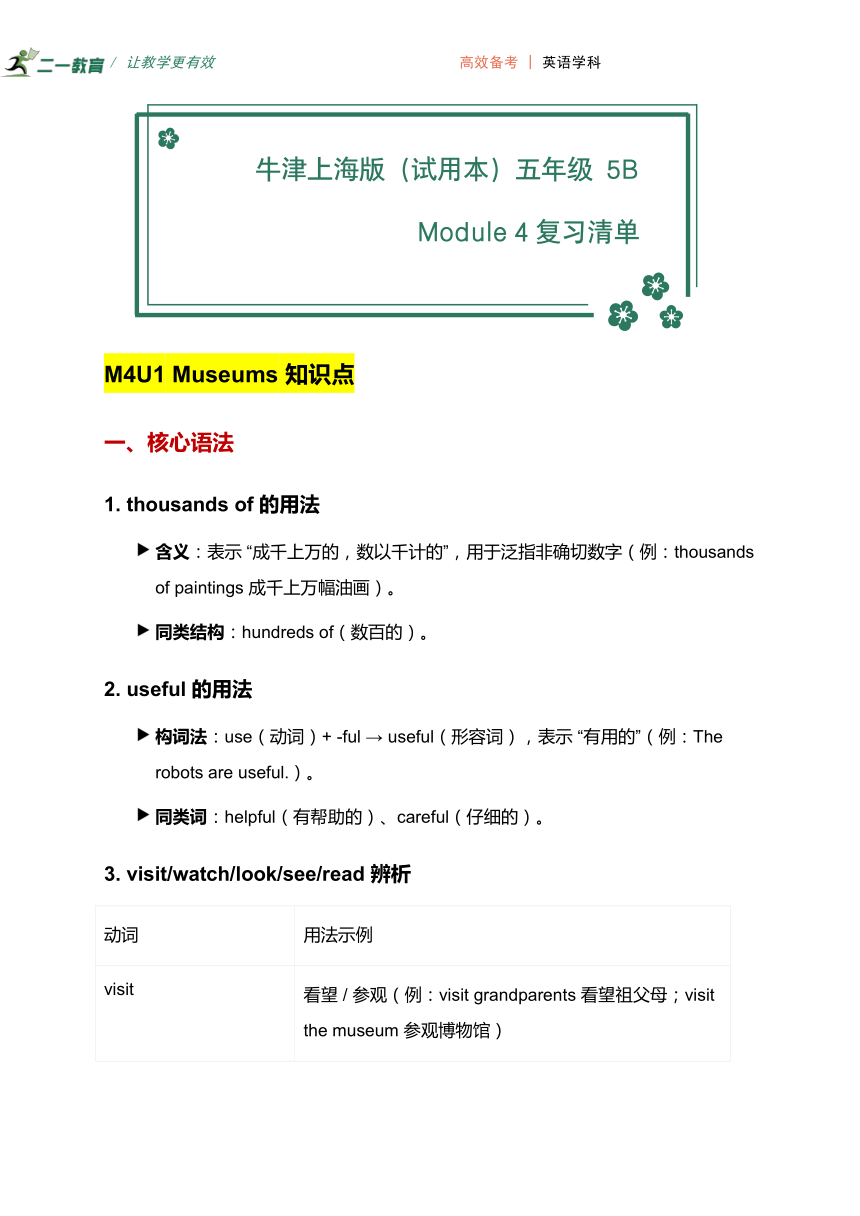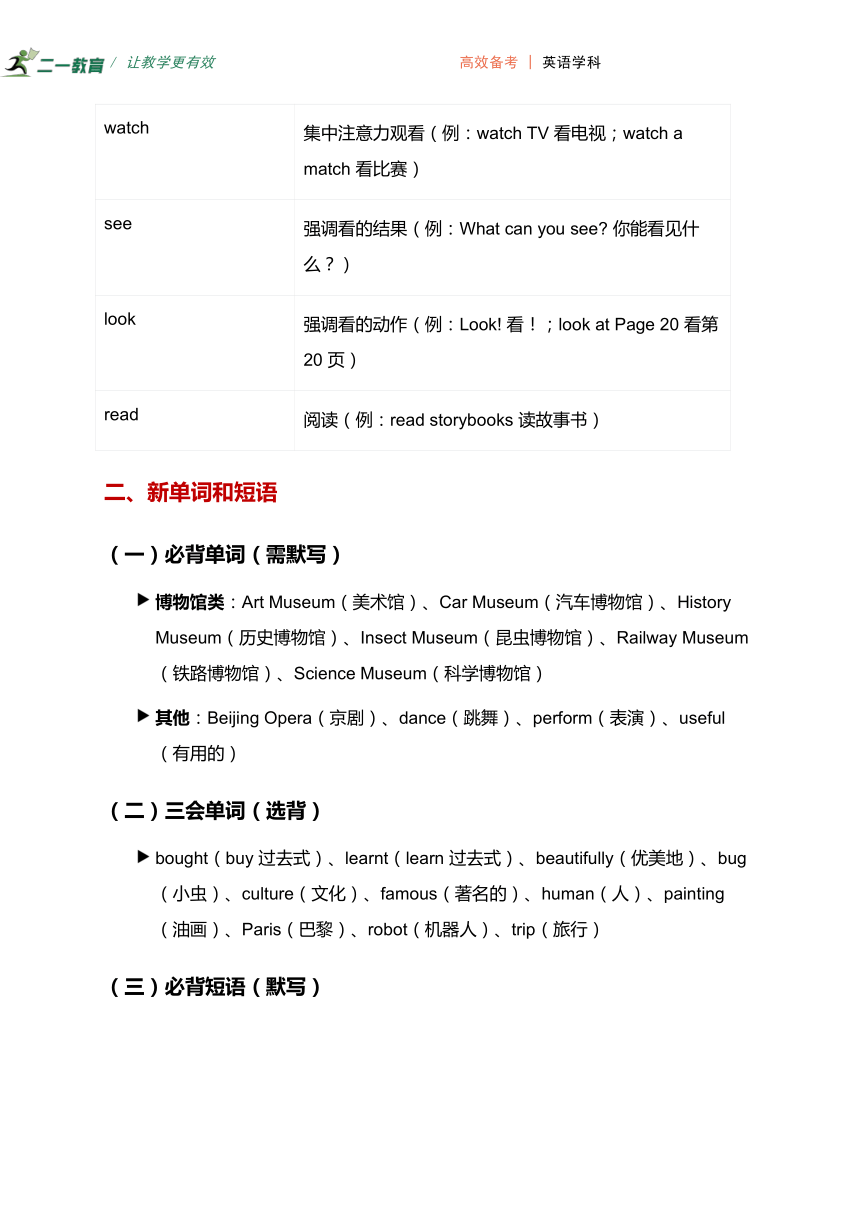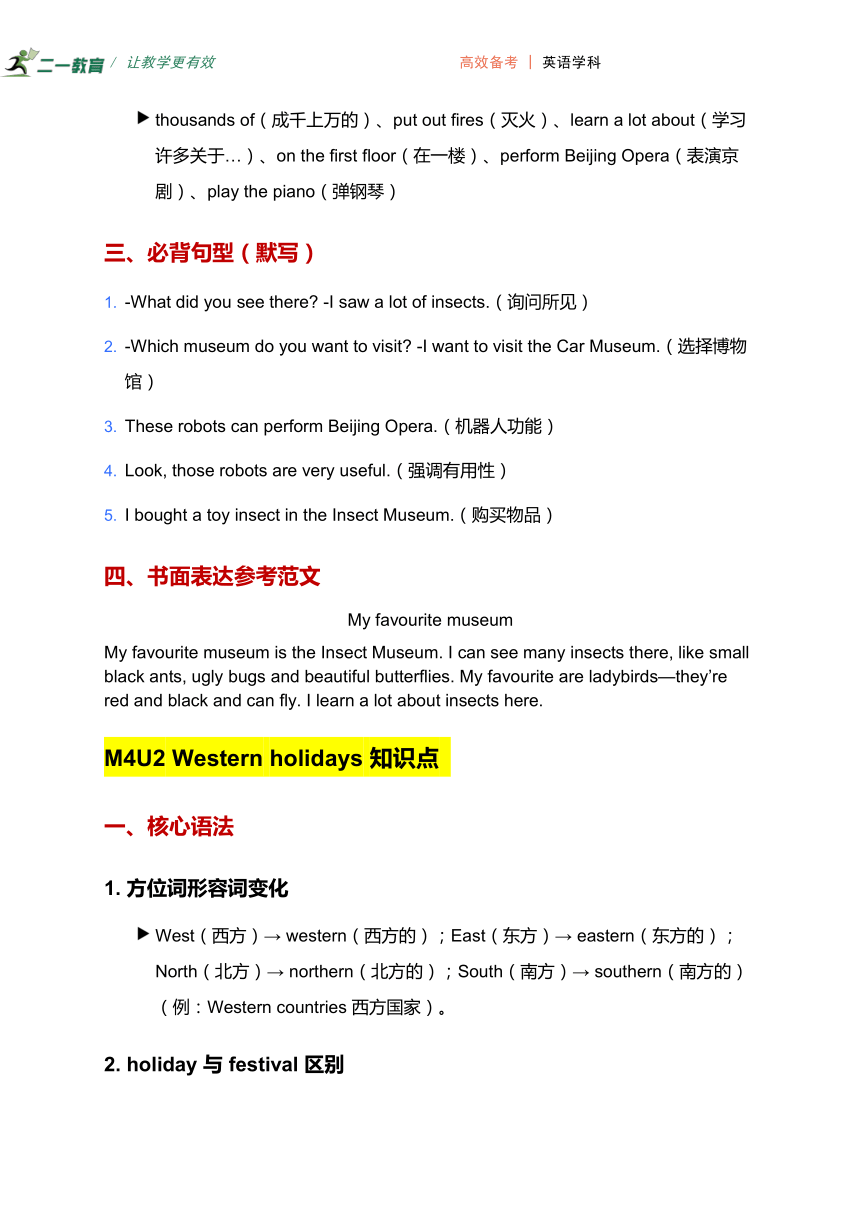小学英语牛津上海版(试用本)五年级下册Module 4 More things to learn 复习清单
文档属性
| 名称 | 小学英语牛津上海版(试用本)五年级下册Module 4 More things to learn 复习清单 |

|
|
| 格式 | docx | ||
| 文件大小 | 332.5KB | ||
| 资源类型 | 试卷 | ||
| 版本资源 | 牛津上海版(试用本) | ||
| 科目 | 英语 | ||
| 更新时间 | 2025-06-05 11:20:32 | ||
图片预览



文档简介
/ 让教学更有效 高效备考 | 英语学科
M4U1 Museums 知识点
一、核心语法
1. thousands of 的用法
含义:表示 “成千上万的,数以千计的”,用于泛指非确切数字(例:thousands of paintings 成千上万幅油画)。
同类结构:hundreds of(数百的)。
2. useful 的用法
构词法:use(动词)+ -ful → useful(形容词),表示 “有用的”(例:The robots are useful.)。
同类词:helpful(有帮助的)、careful(仔细的)。
3. visit/watch/look/see/read 辨析
动词
用法示例
visit
看望 / 参观(例:visit grandparents 看望祖父母;visit the museum 参观博物馆)
watch
集中注意力观看(例:watch TV 看电视;watch a match 看比赛)
see
强调看的结果(例:What can you see 你能看见什么?)
look
强调看的动作(例:Look! 看!;look at Page 20 看第 20 页)
read
阅读(例:read storybooks 读故事书)
二、新单词和短语
(一)必背单词(需默写)
博物馆类:Art Museum(美术馆)、Car Museum(汽车博物馆)、History Museum(历史博物馆)、Insect Museum(昆虫博物馆)、Railway Museum(铁路博物馆)、Science Museum(科学博物馆)
其他:Beijing Opera(京剧)、dance(跳舞)、perform(表演)、useful(有用的)
(二)三会单词(选背)
bought(buy 过去式)、learnt(learn 过去式)、beautifully(优美地)、bug(小虫)、culture(文化)、famous(著名的)、human(人)、painting(油画)、Paris(巴黎)、robot(机器人)、trip(旅行)
(三)必背短语(默写)
thousands of(成千上万的)、put out fires(灭火)、learn a lot about(学习许多关于…)、on the first floor(在一楼)、perform Beijing Opera(表演京剧)、play the piano(弹钢琴)
三、必背句型(默写)
-What did you see there -I saw a lot of insects.(询问所见)
-Which museum do you want to visit -I want to visit the Car Museum.(选择博物馆)
These robots can perform Beijing Opera.(机器人功能)
Look, those robots are very useful.(强调有用性)
I bought a toy insect in the Insect Museum.(购买物品)
四、书面表达参考范文
My favourite museum
My favourite museum is the Insect Museum. I can see many insects there, like small black ants, ugly bugs and beautiful butterflies. My favourite are ladybirds—they’re red and black and can fly. I learn a lot about insects here.
M4U2 Western holidays 知识点
一、核心语法
1. 方位词形容词变化
West(西方)→ western(西方的);East(东方)→ eastern(东方的);North(北方)→ northern(北方的);South(南方)→ southern(南方的)(例:Western countries 西方国家)。
2. holiday 与 festival 区别
holiday:假期 / 节日(例:winter holiday 寒假;Christmas holiday 圣诞节)。
festival:传统节日(例:the Spring Festival 春节;the Dragon Boat Festival 端午节)。
3. go on 的用法
表示 “进行”(例:go on an outing 出游;go on a trip 去旅行)。
4. trick 的用法
名词:“把戏,花招”(例:play a trick on sb. 捉弄某人)。
固定搭配:trick-or-treat(万圣节 “不给糖就捣乱”)。
二、新单词和短语
(一)必背单词(默写)
节日类:Christmas(圣诞节)、Easter(复活节)、Halloween(万圣节)、Thanksgiving(感恩节)、holiday(节日)
动作类:find(找到)、hide(隐藏)、present(礼物)
(二)三会单词(选背)
candle(蜡烛)、hunt(寻找)、monster(怪物)、pumpkin(南瓜)、turkey(火鸡)、chocolate(巧克力)、decorate(装饰)、sleigh(雪橇)
(三)必背短语(默写)
fancy-dress party(化妆舞会)、play a trick on(搞恶作剧)、jack-o’-lantern(南瓜灯)、go trick-or-treating(玩 “不给糖就捣蛋”)、give presents to each other(互相送礼物)、go on an egg hunt(寻蛋活动)
三、必背句型(默写)
-What’s your favourite holiday -My favourite holiday is Easter.(询问最喜爱节日)
-What do you do at Easter -We usually go on an egg hunt.(询问节日活动)
Halloween is on the 31st of October.(节日日期)
-When is Thanksgiving -It’s on the fourth Thursday of November.(感恩节日期
The Dragon Boat Festival is my favorite Chinese festival.(中国节日表达)
四、书面表达参考范文
My favourite holiday
My favourite holiday is Halloween. It’s an interesting Western holiday on the 31st of October. We make jack-o’-lanterns, eat pumpkin pies and have fancy-dress parties. Children go trick-or-treating and say “Trick or treat!”. It’s so fun!
M4U3 Story time 知识点
一、核心语法
1. 动词 + 副词词组
常见搭配:go out(外出)、get out(出去)、run away(逃走)、put up(放置 / 张贴)、look out(向外看)、break down(推倒)、keep out(禁止入内)。
同类词组:stand up(起立)、put on(穿上)、take off(脱掉)、throw away(扔掉)。
2. break down 的用法
表示 “推倒;拆除”(例:Firefighters broke down the door. 消防员破门而入)。
3. forever and ever 的用法
表示 “永远”(例:They will remember forever. 他们会永远记得)。
4. look out 的双重含义
向外看:The giant looked out of the window. 巨人向窗外看。
当心:Look out! A car is coming. 小心!车来了。
5. arrive 的用法
搭配:arrive at/in + 地点(例:arrive at school 到达学校);arrive home(到家,副词前不加介词)。
二、新单词和短语
(一)必背单词(默写)
castle(城堡)、giant(巨人)、feel(触摸;感觉)、forever(永远)、through(穿过)、build(建造)、shout(叫喊)、arrive(到达)
(二)必背短语(默写)
at last(最终)、from then on(从那时起)、break down(推倒)、in the castle(在城堡里)、long long ago(很久以前)、put up(张贴)、look out of the window(看窗外)、build a tall wall(造高墙)
三、必背句型(默写)
Long long ago, a giant lived in the castle.(故事开头)
The giant built a tall wall all around the garden and put up a sign.(巨人行为)
Why doesn’t Miss Spring come this year (询问原因)
There is snow everywhere.(环境描写)
They come into the garden through a hole in the wall.(进入方式)
From then on, Miss Spring... never came late again.(故事结局)
四、书面表达参考范文
My favourite season
My favourite season is summer. It’s sunny and hot, and we often go swimming. I like eating ice-cream and watermelons. We can play in the park and enjoy the long holidays. Summer is full of fun!
M4U1 Museums 知识点
一、核心语法
1. thousands of 的用法
含义:表示 “成千上万的,数以千计的”,用于泛指非确切数字(例:thousands of paintings 成千上万幅油画)。
同类结构:hundreds of(数百的)。
2. useful 的用法
构词法:use(动词)+ -ful → useful(形容词),表示 “有用的”(例:The robots are useful.)。
同类词:helpful(有帮助的)、careful(仔细的)。
3. visit/watch/look/see/read 辨析
动词
用法示例
visit
看望 / 参观(例:visit grandparents 看望祖父母;visit the museum 参观博物馆)
watch
集中注意力观看(例:watch TV 看电视;watch a match 看比赛)
see
强调看的结果(例:What can you see 你能看见什么?)
look
强调看的动作(例:Look! 看!;look at Page 20 看第 20 页)
read
阅读(例:read storybooks 读故事书)
二、新单词和短语
(一)必背单词(需默写)
博物馆类:Art Museum(美术馆)、Car Museum(汽车博物馆)、History Museum(历史博物馆)、Insect Museum(昆虫博物馆)、Railway Museum(铁路博物馆)、Science Museum(科学博物馆)
其他:Beijing Opera(京剧)、dance(跳舞)、perform(表演)、useful(有用的)
(二)三会单词(选背)
bought(buy 过去式)、learnt(learn 过去式)、beautifully(优美地)、bug(小虫)、culture(文化)、famous(著名的)、human(人)、painting(油画)、Paris(巴黎)、robot(机器人)、trip(旅行)
(三)必背短语(默写)
thousands of(成千上万的)、put out fires(灭火)、learn a lot about(学习许多关于…)、on the first floor(在一楼)、perform Beijing Opera(表演京剧)、play the piano(弹钢琴)
三、必背句型(默写)
-What did you see there -I saw a lot of insects.(询问所见)
-Which museum do you want to visit -I want to visit the Car Museum.(选择博物馆)
These robots can perform Beijing Opera.(机器人功能)
Look, those robots are very useful.(强调有用性)
I bought a toy insect in the Insect Museum.(购买物品)
四、书面表达参考范文
My favourite museum
My favourite museum is the Insect Museum. I can see many insects there, like small black ants, ugly bugs and beautiful butterflies. My favourite are ladybirds—they’re red and black and can fly. I learn a lot about insects here.
M4U2 Western holidays 知识点
一、核心语法
1. 方位词形容词变化
West(西方)→ western(西方的);East(东方)→ eastern(东方的);North(北方)→ northern(北方的);South(南方)→ southern(南方的)(例:Western countries 西方国家)。
2. holiday 与 festival 区别
holiday:假期 / 节日(例:winter holiday 寒假;Christmas holiday 圣诞节)。
festival:传统节日(例:the Spring Festival 春节;the Dragon Boat Festival 端午节)。
3. go on 的用法
表示 “进行”(例:go on an outing 出游;go on a trip 去旅行)。
4. trick 的用法
名词:“把戏,花招”(例:play a trick on sb. 捉弄某人)。
固定搭配:trick-or-treat(万圣节 “不给糖就捣乱”)。
二、新单词和短语
(一)必背单词(默写)
节日类:Christmas(圣诞节)、Easter(复活节)、Halloween(万圣节)、Thanksgiving(感恩节)、holiday(节日)
动作类:find(找到)、hide(隐藏)、present(礼物)
(二)三会单词(选背)
candle(蜡烛)、hunt(寻找)、monster(怪物)、pumpkin(南瓜)、turkey(火鸡)、chocolate(巧克力)、decorate(装饰)、sleigh(雪橇)
(三)必背短语(默写)
fancy-dress party(化妆舞会)、play a trick on(搞恶作剧)、jack-o’-lantern(南瓜灯)、go trick-or-treating(玩 “不给糖就捣蛋”)、give presents to each other(互相送礼物)、go on an egg hunt(寻蛋活动)
三、必背句型(默写)
-What’s your favourite holiday -My favourite holiday is Easter.(询问最喜爱节日)
-What do you do at Easter -We usually go on an egg hunt.(询问节日活动)
Halloween is on the 31st of October.(节日日期)
-When is Thanksgiving -It’s on the fourth Thursday of November.(感恩节日期
The Dragon Boat Festival is my favorite Chinese festival.(中国节日表达)
四、书面表达参考范文
My favourite holiday
My favourite holiday is Halloween. It’s an interesting Western holiday on the 31st of October. We make jack-o’-lanterns, eat pumpkin pies and have fancy-dress parties. Children go trick-or-treating and say “Trick or treat!”. It’s so fun!
M4U3 Story time 知识点
一、核心语法
1. 动词 + 副词词组
常见搭配:go out(外出)、get out(出去)、run away(逃走)、put up(放置 / 张贴)、look out(向外看)、break down(推倒)、keep out(禁止入内)。
同类词组:stand up(起立)、put on(穿上)、take off(脱掉)、throw away(扔掉)。
2. break down 的用法
表示 “推倒;拆除”(例:Firefighters broke down the door. 消防员破门而入)。
3. forever and ever 的用法
表示 “永远”(例:They will remember forever. 他们会永远记得)。
4. look out 的双重含义
向外看:The giant looked out of the window. 巨人向窗外看。
当心:Look out! A car is coming. 小心!车来了。
5. arrive 的用法
搭配:arrive at/in + 地点(例:arrive at school 到达学校);arrive home(到家,副词前不加介词)。
二、新单词和短语
(一)必背单词(默写)
castle(城堡)、giant(巨人)、feel(触摸;感觉)、forever(永远)、through(穿过)、build(建造)、shout(叫喊)、arrive(到达)
(二)必背短语(默写)
at last(最终)、from then on(从那时起)、break down(推倒)、in the castle(在城堡里)、long long ago(很久以前)、put up(张贴)、look out of the window(看窗外)、build a tall wall(造高墙)
三、必背句型(默写)
Long long ago, a giant lived in the castle.(故事开头)
The giant built a tall wall all around the garden and put up a sign.(巨人行为)
Why doesn’t Miss Spring come this year (询问原因)
There is snow everywhere.(环境描写)
They come into the garden through a hole in the wall.(进入方式)
From then on, Miss Spring... never came late again.(故事结局)
四、书面表达参考范文
My favourite season
My favourite season is summer. It’s sunny and hot, and we often go swimming. I like eating ice-cream and watermelons. We can play in the park and enjoy the long holidays. Summer is full of fun!
同课章节目录
- Module 1 Using my five senses
- Unit 1 What a mess!
- Unit 2 Watch it grow!
- Unit 3 How noisy!
- Module 2 My favourite things
- Unit 1 Food and drinks
- Unit 2 Films
- Unit 3 School subjects
- Module 3 Things around us
- Unit 1 Signs
- Unit 2 Weathe
- Unit 3 Changes
- Module 4 More things to learm
- Unit 1 Museums
- Unit 2 Western holidays
- Unit 3 Story time
